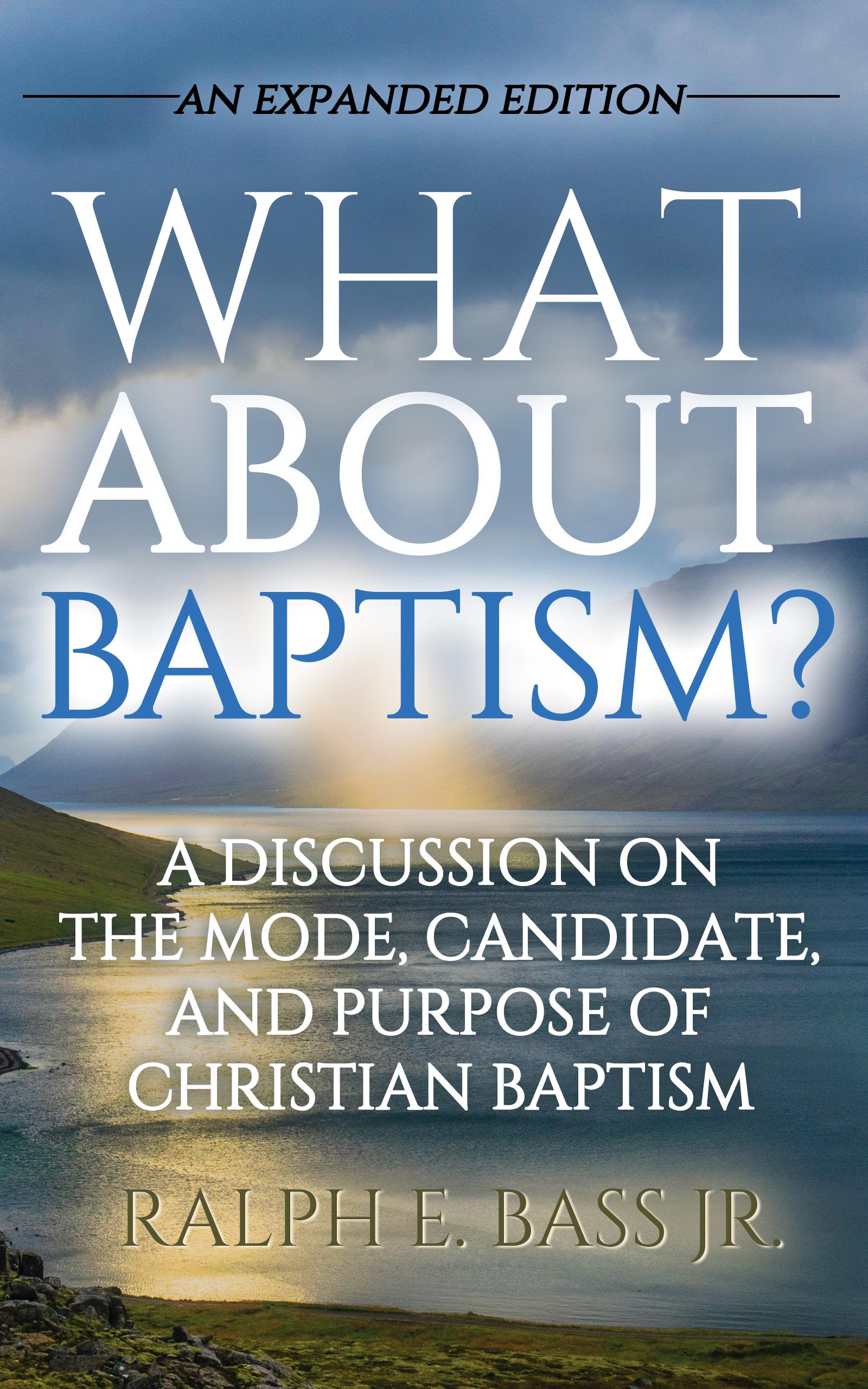
Hi, My Name Is Ralph Bass...This Is My Library


Subscribe to this Site
More Objections to Dipping
Would those that advocate immersion baptism call into question the validity of the Lord’s Supper to those who did not use wine? Or failed to use unleavened bread? Or failed to use a common loaf or common cup? Or had the Lord’s Supper at noontime instead of at suppertime? Probably they would not. Where is the consistency here? Why is the mode of one sacrament elevated to the place of an unhesitating willingness to break fellowship over it, and the mode of another sacrament virtually ignored?
The response would probably be, “Why, we focus on the essentials of the Supper. Bread is good, but crackers are okay, too. Wine is good, but grape juice will do just as well. Supper is nice, but noon works just as well. It is the essential elements that are important and the spiritual reality behind them, not the detailed accouterments or trappings.” Yet, this same person will then say that the essential elements of baptism, as seen by affusionists (water, a Trinitarian formula, and an ordained minister), are invalid. Indeed, he would say the affusionists are hypocritical and that the detailed addition of complete dipping is essential or there is no baptism at all; interesting.
“But supposing a denomination should arise who would adopt reclining as their posture, and who would declare that this being the original mode of observance none other was valid, and they who adopted any other posture did not really observe the ordinance at all, but mocked the Almighty, and were guilty of a
Let's Look Inside
the Book


Immersion Baptism and The Mode of the Lord’s Supper
It is rather interesting that those who give such tremendous attention to the mode of baptism are rather lax in their mode of the Lord’s Supper. If the mode of the one is so vital to true Christian obedience, why is the mode of the other so unimportant
Consider the mode of the original Lord’s Supper. First, it was administered only to men. Second, it was administered while reclining on their elbows on couches. Third, it was administered at a table. Fourth, unleavened bread was used. Fifth, they broke their portion from a common loaf. Sixth, all drank from a common cup. Seventh, they drank wine, not grape juice. Eighth, it was administered during the evening hours, which is why it is called a supper. Few, sometimes none, of these practices are followed today by dipping churches. Yet, Christ’s own example is at stake here. If mode is so important in baptism, why is it so unimportant in the Lord’s Supper?
It is rather interesting that those who give such tremendous attention to the mode of baptism are rather lax in their mode of the Lord’s Supper. If the mode of the one is so vital to true Christian obedience, why is the mode of the other so unimportant
Consider the mode of the original Lord’s Supper. First, it was administered only to men. Second, it was administered while reclining on their elbows on couches. Third, it was administered at a table. Fourth, unleavened bread was used. Fifth, they broke their portion from a common loaf. Sixth, all drank from a common cup. Seventh, they drank wine, not grape juice. Eighth, it was administered during the evening hours, which is why it is called a supper. Few, sometimes none, of these practices are followed today by dipping churches. Yet, Christ’s own example is at stake here. If mode is so important in baptism, why is it so unimportant in the Lord’s Supper?
great sin.”[1] And indeed because they did not properly observe the Lord’s Supper, they were not true churches at all. With what name would these people be called? Perhaps Reclinists? Suppose that happened indeed, but it was a special mode of immersion baptism that they (incorrectly) believed was the original mode, even though the overwhelming testimony of Scripture and church history was against them; with what name would these people be called? Perhaps Baptists?
Immersion Baptism and False Assurance
It is claimed by some that advocate immersion baptism that the baptism of children gives the unconverted a false assurance that they are Christians and thereby undermines the gospel message. “Many a man has felt that he is on his way to heaven even though he has had no personal experience of conversion simply because he was ‘baptized’ in infancy…. …the practice of ‘infant baptism’ leads to a worldly church filled with unregenerate members.”[2]
Your author has counseled with hundreds of people, all of which were asked about their spiritual condition. Many appeared to be “worldly” church members, if not unbelievers, but yet, church members nonetheless. When asked how they knew they were Christians, they often replied as follows: “I got saved when I was ten years old.” “I prayed and asked Jesus to save me.” “I was born again when I was in Sunday school.” “I was baptized and joined the church when I was growing up.” “My Sunday school teacher took me aside and prayed for me.” “I walked the aisle.” “I joined the church.” “The preacher took my hand and we prayed.” And many other such answers. I have yet to have one person tell me that they believed they were a Christian because they were baptized when a baby.
It appears to me that any church, advocates of immersion baptism or pedo-baptists, that preaches a gospel that substitutes the religious actions or works of man for the sovereign work of God in bringing sinners to repentance and faith in Christ is guilty of imparting a “false assurance” that results in a “worldly church.”
Consider this point: There are many who partake of the Lord’s Supper who are not believers, either. However, we do not fail to partake of the holy meal simply because of the false assurance others obtain by doing so. That being the case, why should we fail to follow the Scriptures in covenant baptism just because some obtain a false assurance by doing so? Indeed, we should no more cease performing our covenant baptisms than we should cease taking the Lord’s Supper for such reasons.
“If infant membership were the great corrupter, and its absence the great safeguard, immersed Churches ought to be uniformly pure.”[3] Such does not appear to be the case!
-----------------------------------------------------------------
[1] Mackay, W. A., pg. 2.
[2] Pardee, William H., Baptism, no press, no date, pg. 42.
[3] Dabney, Robert L., pg. 793.
Immersion Baptism and False Assurance
It is claimed by some that advocate immersion baptism that the baptism of children gives the unconverted a false assurance that they are Christians and thereby undermines the gospel message. “Many a man has felt that he is on his way to heaven even though he has had no personal experience of conversion simply because he was ‘baptized’ in infancy…. …the practice of ‘infant baptism’ leads to a worldly church filled with unregenerate members.”[2]
Your author has counseled with hundreds of people, all of which were asked about their spiritual condition. Many appeared to be “worldly” church members, if not unbelievers, but yet, church members nonetheless. When asked how they knew they were Christians, they often replied as follows: “I got saved when I was ten years old.” “I prayed and asked Jesus to save me.” “I was born again when I was in Sunday school.” “I was baptized and joined the church when I was growing up.” “My Sunday school teacher took me aside and prayed for me.” “I walked the aisle.” “I joined the church.” “The preacher took my hand and we prayed.” And many other such answers. I have yet to have one person tell me that they believed they were a Christian because they were baptized when a baby.
It appears to me that any church, advocates of immersion baptism or pedo-baptists, that preaches a gospel that substitutes the religious actions or works of man for the sovereign work of God in bringing sinners to repentance and faith in Christ is guilty of imparting a “false assurance” that results in a “worldly church.”
Consider this point: There are many who partake of the Lord’s Supper who are not believers, either. However, we do not fail to partake of the holy meal simply because of the false assurance others obtain by doing so. That being the case, why should we fail to follow the Scriptures in covenant baptism just because some obtain a false assurance by doing so? Indeed, we should no more cease performing our covenant baptisms than we should cease taking the Lord’s Supper for such reasons.
“If infant membership were the great corrupter, and its absence the great safeguard, immersed Churches ought to be uniformly pure.”[3] Such does not appear to be the case!
-----------------------------------------------------------------
[1] Mackay, W. A., pg. 2.
[2] Pardee, William H., Baptism, no press, no date, pg. 42.
[3] Dabney, Robert L., pg. 793.
















































































































